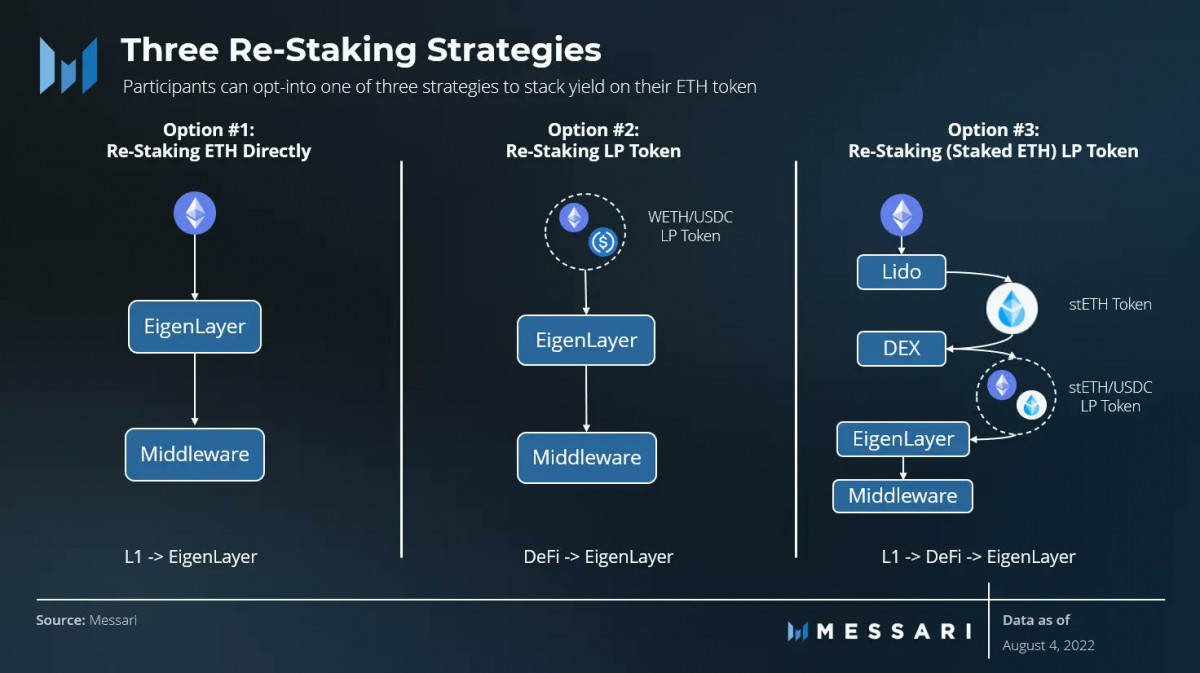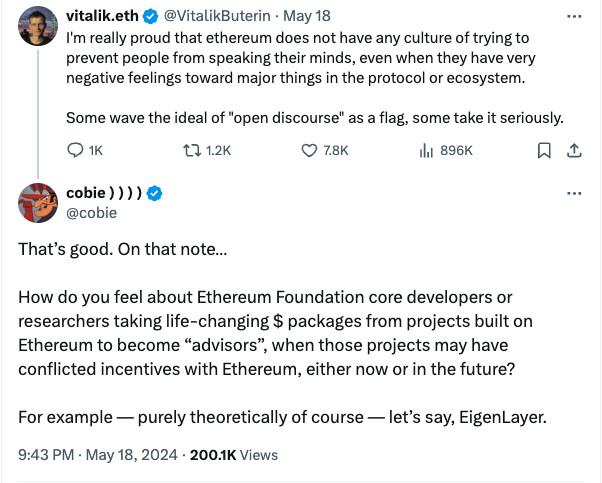Ethereum Community Split Over Researcher’s Advisory Role at EigenLayer Amid Potential Conflict of Interest Concerns


In Brief
Ethereum researcher Justin Drake has accepted a paid advisory role at EigenLayer, a protocol allowing Ether re-staking, sparking controversy over potential conflicts of interest.
The choice of a well-known Ethereum researcher to accept a paid advisory position at EigenLayer—a protocol that permits Ether “re-staking”—has generated a great deal of controversy in the cryptocurrency world around possible conflicts of interest. Reputable Ethereum Foundation researcher Justin Drake revealed that he has taken an advising role with EigenFoundation, the company that created EigenLayer. EIGEN tokens, which have a three-year vesting period and have the potential to be worth millions of dollars, are an important monetary incentive for this new profession.
The disclosure has sparked questions about Drake’s capacity to conduct unbiased research and provide objective advice on the hazards involved with EigenLayer restaking. Some contend that having a major financial interest in the project might unreasonably sway his opinions and suggestions, putting his own interests at odds with those of the larger Ethereum community.
What Is EigenLayer?
A novel, AI-free, and free of plagiarism crypto economic layer called EigenLayer adds restaking to the Ethereum environment. This idea enables users to increase the usefulness of their staked capital if they have committed their Ether (ETH) to verify the Ethereum network. These stakers have the option to freely distribute their locked Ethereum using EigenLayer to validate and safeguard more decentralized apps, sidechains, and services inside the Ethereum ecosystem.
This novel strategy departs from the conventional paradigm, in which staked Ethereum is used only for the upkeep of the main Ethereum system. By enabling their assets to carry out broader cybersecurity tasks across the Ethereum ecosystem, holders of supplementary incentives are rewarded. In order to create strong decentralized security without having to deal with the hassle of individually maintaining a separate validator system, developing applications may use EigenLayer’s pool of restaked ETH.

Photo: Messari
Drake has justified his choice, claiming that his job is specifically to look into the dangers of restaking. Despite the possible ethical implications, he insists that his basic position will “continue to lean critical of EigenLayer.” To prevent making the same mistakes that liquid staking has in earlier times, he sees this as a way to interact with and influence the restaking narrative from within actively.
Drake stated that he intended to act as an advisor to directly engage in restaking matters and steer EigenLayer from the inside out. In an extensive post on the social networking site X (formerly Twitter), he acknowledged that he believed he had not done enough study on liquid staking in his capacity as a researcher. He views this advising position as a chance to prevent making the same error twice when it comes to restaking.
The Reaction of Vitalik Buterin
Following the announcement, cryptocurrency broker Jordan Fish, commonly known as Cobie, confronted Ethereum co-founder Vitalik Buterin directly about the ethical implications of such arrangements. Fish posed a hypothetical query on Buterin’s stance on Ethereum Foundation staff members “collecting profound [monetary] deals” from Ethereum-based projects that “could violate interests with Ethereum,” citing EigenLayer as an illustration.

Though Buterin refrained from publicly responding, the debate has rekindled more general discussions on the possibility of issues of interest inside the Ethereum ecosystem, especially when new initiatives and protocols with their own tokenomics and financial incentives come to light.
Criticism Over the EigenLayer and Its Initiatives
Drake sought to refute claims made by others that EigenLayer is trying to “systematically ‘bribe’ or ‘corrupt'” the Ethereum Foundation in his defense. Just a small number of the foundation’s more than 300 members, he pointed out, had official connections to EigenLayer businesses. Drake said he believes his colleagues to be morally upright and that he does not “see the 1% of EFers formally involved with EigenLayer compromising their morals.”
Still, there’s more to the dispute than just Drake’s personal part. The community has scrutinized and criticized EigenLayer for its airdrop and token distribution policies. After receiving criticism for its first program’s excessive restrictions, the protocol airdropped an extra 28 million EIGEN tokens to users at the beginning of May.
The protocol’s initial airdrop was met with criticism from users for a number of reasons, such as a 15% allocation that was lower than anticipated, a non-transferable token structure, and stringent geo-blocking measures that prevented participation from many nations, including China, Russia, the United States, and Canada.
In order to allay these worries and involve a larger number of users who had engaged with the protocol during its testnet period, an extra airdrop was conducted. Regarding EigenLayer’s tokenomics and the payout to early backers and stakeholders, there are still unanswered concerns.
Several business leaders have supported Drake for his honesty throughout these discussions. Drake’s choice to publicly reveal his engagement and the accompanying financial incentives was applauded by Robbie Nakarmi, Director of Crypto Investments at Standard Chartered Ventures, and David Wong, co-founder of security firm zkSecurity.
Others, meanwhile, are unconvinced, seeing the large token incentive as a possible source of undue influence that may, even unintentionally, tilt Drake’s findings and recommendations in EigenLayer’s favor.
The Debates Over the Situation Keep Going
The case emphasizes how difficult it is to strike a balance between encouraging innovation within the Ethereum ecosystem and upholding moral principles, accountability, and openness. The possibility of conflicts of interest grows more complicated as new initiatives and protocols appear, providing innovative incentive systems and economic models.
According to one theory, financial incentives linked to a project’s success may unintentionally affect researchers, developers, or consultants, jeopardizing their neutrality and ability to make impartial decisions. On the other hand, proponents contend that these incentives promote ownership and accountability by encouraging active participation and a stake in the ecosystem’s long-term success and stability.
The discussion has larger ramifications for the Ethereum community and the larger cryptocurrency environment than just the particular example of Drake and EigenLayer. Strong governance structures, moral standards, and openness protocols are essential as the sector develops and more money pours into creative endeavors.
Some contend that in order to guarantee that monetary advantages and ties are honestly acknowledged and handled properly, it is necessary to develop explicit conflict of interest regulations and disclosure requirements. Some, on the other hand, support a more autonomous and community-driven strategy in which mutual observation and examination naturally serve as a check against any conflicts.
In the end, the debate over Drake’s EigenLayer advisory position highlights the difficult issues involved in striking a balance between incentives, innovation, and moral behavior in the quickly developing realm of digital and decentralized applications. These discussions will probably continue as the Ethereum ecosystem develops and grows, influencing the community’s eventual leadership and decision-making procedures.
Disclaimer
In line with the Trust Project guidelines, please note that the information provided on this page is not intended to be and should not be interpreted as legal, tax, investment, financial, or any other form of advice. It is important to only invest what you can afford to lose and to seek independent financial advice if you have any doubts. For further information, we suggest referring to the terms and conditions as well as the help and support pages provided by the issuer or advertiser. MetaversePost is committed to accurate, unbiased reporting, but market conditions are subject to change without notice.
About The Author
Victoria is a writer on a variety of technology topics including Web3.0, AI and cryptocurrencies. Her extensive experience allows her to write insightful articles for the wider audience.
More articles

Victoria is a writer on a variety of technology topics including Web3.0, AI and cryptocurrencies. Her extensive experience allows her to write insightful articles for the wider audience.


















































